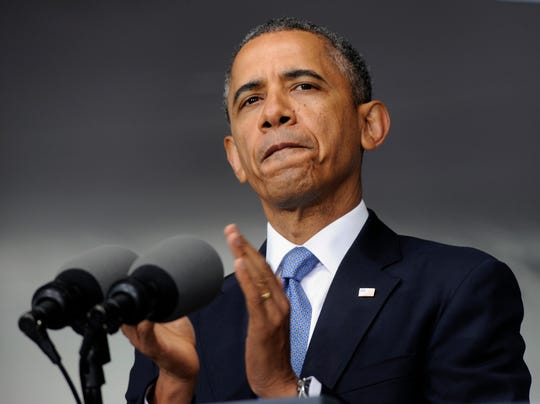
President Obama sought Wednesday to recast American foreign policy after more than a decade of war in Iraq and Afghanistan, outlining an approach built on alliances with other nations designed to combat terrorism and other global threats.
"America must always lead on the world stage," Obama told graduates of the U.S. Military Academy, but he added that "military action cannot be the only — or even primary — component of our leadership in every instance."
He added: "Just because we have the best hammer does not mean that every problem is a nail."
FIRST TAKE: Obama makes case for a multilateral vision
In a comprehensive 46-minute address that ranged from civil war in Syria to the threat of climate change, Obama:
• Proposed a new fund of up to $5 billion to help allies battle groups that engage in terrorism, calling it a prime example of multilateral action.
• Said that more than a dozen years after the terrorist attacks of Sept. 11, 2001, terrorism remains "the most direct threat to America at home and abroad."
• Announced that the administration is looking at ways to help train rebels in Syria battling Bashar al-Assad's government.
• Defended his foreign policy against Republicans and others who claim he has been weak, saying that his critics are all too willing to use military force.
Obama, who campaigned for the presidency in 2008 by opposing the Iraq war and other actions of the George W. Bush administration, said that "I believe in American exceptionalism with every fiber of my being. But what makes us exceptional is not our ability to flout international norms and the rule of law; it is our willingness to affirm them through our actions."
Republican critics were unmoved.
Rep. Ed Royce, R-Calif., chairman of the House Foreign Affairs Committee, said the Obama administration has underestimated threats like the nuclear programs of Iran and North Korea. He said Obama has too often used "strong words" followed by "weak actions" against foes.
"President Obama's diplomatic efforts cannot work if our allies lack confidence in U.S. commitments, and our opponents do not fear U.S. warnings," Royce said.
Another frequent critic, Sen. John McCain, R-Ariz., said Obama is attacking "straw men," while ignoring the real question of "how to combine our tools of soft power and hard power in order to avoid conflict, secure our interests and ideals, and meet our challenges through effective deterrence and diplomacy."
Obama's "failure in this regard" is reflected in aggression by China, Russia and Syria, McCain said.
In his speech, Obama discussed efforts to strike a deal over Iran's nuclear program and confront Russia over its incursion into Ukraine. He praised last year's agreement with Syria to remove chemical weapons, reached after he called off a possible military strike against Assad's government.
Obama said the United States will keep helping Nigeria look for kidnapped schoolgirls, and he defended the use of drone strikes in terrorist havens like Yemen and Somalia.
"The question we face ... is not whether America will lead, but how we will lead," Obama said.
The speech came a day after Obama announced a final drawdown plan for Afghanistan after U.S. combat operations end later this year. In his commencement address, Obama told the West Point graduates that they will be the first class since 2001 not to be sent to combat theaters in Afghanistan or Iraq, though many challenges remain.
Now, rather than facing a centralized al-Qaeda leadership based in Afghanistan, Obama said the United States must deal with the group's separate affiliates in different countries.
The United States remains the world's leader and its economy is strengthening, but that presents challenges as well as opportunities. Obama said. "Technology and globalization" have given more power to individuals at the expense of states, he said, "raising the capacity of terrorists to do harm."
Taking issue with critics on both the right and the left, Obama said that "it is absolutely true that in the 21st century, American isolationism is not an option" — but that does not mean "that every problem has a military solution."
In apparent references to Vietnam and Iraq, Obama said that "since World War II, some of our most costly mistakes came not from our restraint, but from our willingness to rush into military adventures without thinking through the consequences."
Obama did not disavow the prospect of unilateral American military action, saying he would use it "when our core interests demand it — when our people are threatened; when our livelihoods are at stake; or when the security of our allies is in danger."
In other cases, however, "we should not go it alone," Obama said. "Instead, we must mobilize allies and partners to take collective action."
That includes the proposed "Counterterrorism Partnerships Fund" of up to $5 billion, which must be approved by Congress. The plan would "allow us to train, build capacity, and facilitate partner countries on the front lines" of terrorism, Obama said.
Obama also outlined what he described as elements of American leadership.
They include efforts to provide more public information — "transparency" — about U.S. defense programs, including the use of drones and the much-criticized National Security Agency intelligence surveillance programs.
The president pledged to "strengthen and enforce international order" by working with international institutions, citing the United Nations, NATO, the World Bank, and the International Monetary Fund as prime examples.
The U.S. has worked with other nations to confront Russia over its annexation of land from Ukraine, and to negotiate an agreement with Iran over its nuclear program, Obama said.
He cited "our willingness to act on behalf of human dignity," whether in Nigeria or Egypt.
During their service, Obama said to the West Point graduates, "you will work as a team with diplomats and development experts. You will get to know allies and train partners. You will embody what it means for America to lead."


No comments:
Post a Comment